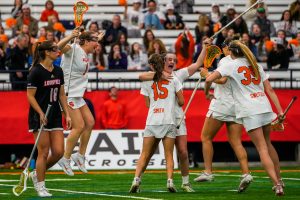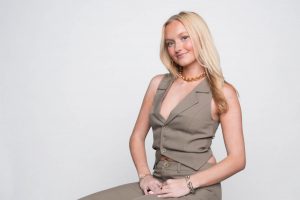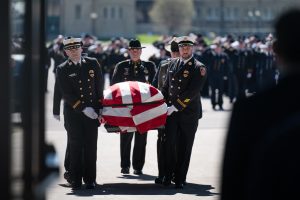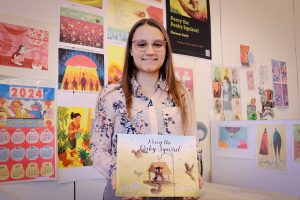Freshman reflects on transition to a semester of virtual classes
Virtually making the transition to college
Sarah Tarbell, who struggled with anxiety throughout middle and high school, said academic and social life at Syracuse University was stressful without being able to interact with others on Zoom and outside of class.
In August, Sarah Tarbell moved into her freshmen dorm room in Flint Hall expecting to attend class in large lecture halls. What she didn’t know was that her classes would all be moved online and she would have to spend that entire time in her room.
Tarbell, who struggled with anxiety throughout middle and high school, said academic and social life at Syracuse University was stressful without being able to interact with others on Zoom and outside of class.
“Classes are already stressful for me,” Tarbell said. “What has always gotten me through them in high school is that social aspect: being able to talk to the person next to you or mini group (activities). You can’t do that on Zoom.”
Tarbell’s anxiety started when she entered elementary school. Before attending school, she was a very social child. But the atmosphere of a classroom with plenty of people but almost complete silence brought her stress at a young age.
After a while, Tarbell started becoming sick almost everyday before going to school. Her parents thought it was from a physical sickness, until a psychiatrist told them that it was related to anxiety.
Once she knew that, Tarbell started to write poems and letters as an outlet to overcome her anxiety.
“I have wanted to be an author since I was extremely little,” Tarbell said. “I guess in middle school or high school, it became this obsession. I would just write and write and write. It was like my main way to escape.”
Since then, Tarbell writes poetry and letters to confront her feelings and as an outlet to express herself. She says she feels no obligation to write a certain way, which allows her to explore it in a way that suits her.
In fifth grade, Tarbell’s family found that she had scoliosis at a five degree curve, which later progressed to 15 degrees. She had to wear a back brace for two years. Teachers singled her out in class for having to stand up to talk, and other students made fun of her for it.
“It took away a lot of my innocence to just see how being a little bit different physically could change the way people I respected and cared about looked at me and treated me,” she said.
The brace altered Tarbell’s social life in ways she couldn’t bear after two years. She said she couldn’t even wear a dress that her friends could wear without it looking crooked and out of place.
The back brace was a measure to fix Tarbell’s back so she didn’t need to get back surgery. Even after wearing the brace, a doctor told Tarbell she needed to get the surgery to fix her spine.
“I had these very overexagerated ideas from my family and from doctors to force me to wear the back brace so I didn’t have to deal with this. The months leading up to the surgery was when my panic attacks started.”
For Tarbell’s family, the surgery represented years of stress for a problem that they wanted to solve without surgery. Tarbell said that in the end, the surgery was not bad compared to the stress that she and her family put on themselves for two years.
Tarbell knew when she came to SU that her first semester was going to be a large adjustment around new students and virtual classes.
At the beginning of the semester, she and her roommate knocked on as many doors in Flint Hall as possible to meet new people. Tarbell tried to register for virtual events, but many of them filled up quickly or felt draining on Zoom, leaving very few options to meet other students.
“I’m a very social person, which people get confused by because of my anxiety,” Tarbell said. “So I feel like if I did have that opportunity to have classes in person, I would have totally been able to make more friends.”
This semester, Tarbell rarely needed to leave Mount Olympus because her classes, many of her friends, a fitness center and a dining hall were available there. She felt like there wasn’t anything else to do on campus where she could safely interact with other students.
To keep herself busy, Tarbell spent her free time this semester continuing to write poetry and playing video games with friends. She felt that many campus clubs were inaccessible or she couldn’t connect with.
Since coming home after the end of in-person instruction at SU, Tarbell was able to go home to see her family, as well as friends who went to other universities and have completely different college stories to share.
“It’s so nice coming home and seeing my mom. We’ve been watching horror movies every night, playing games and just talking,” Tarbell said. “I wasn’t expecting the reconnecting thing to be that important to me. Distance does make the heart grow fonder, for sure.”





